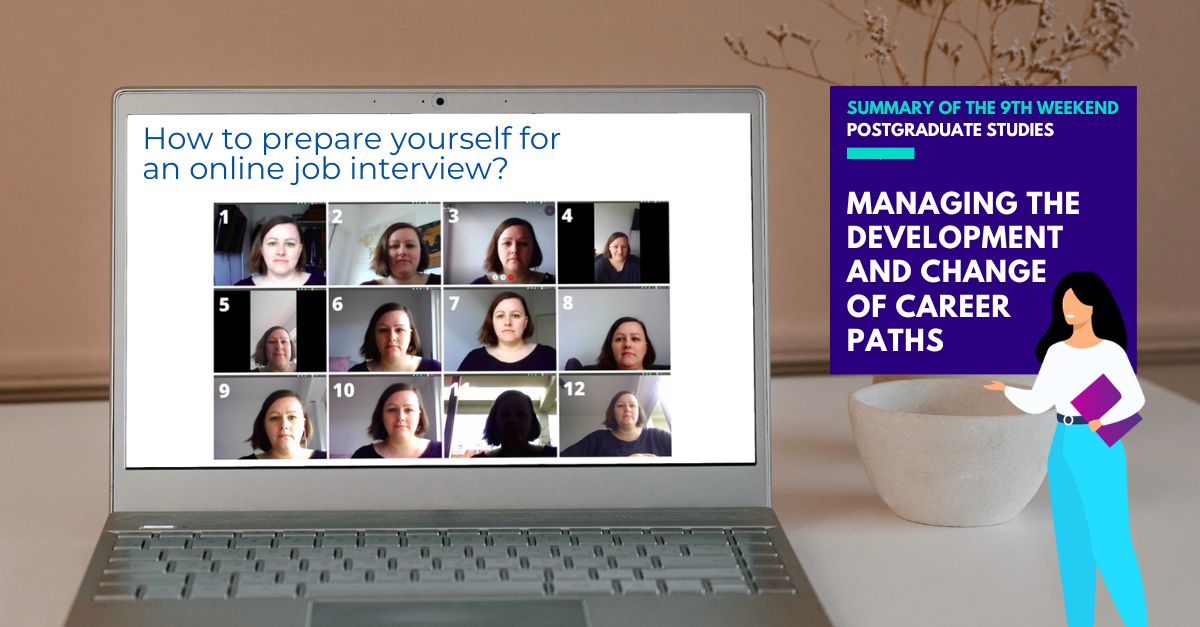
Career Advisory postgraduate studies – after the ninth weekend
“Please tell us something about yourself”, “What is your biggest failure? What did you learn from it?”, “What is your greatest success?”, “How do you handle a stressful situation?”, “Why should we hire you?”. These are standard recruitment questions that can be difficult to answer.
Additionally, nowadays, most of the interviews take place online and besides preparing the content, candidates have to prepare the visual part as well – i.e. they need to have a stable Internet connection, good lighting, quiet space, etc. Up to 90% of candidates do not prepare beforehand – they just go with the flow. They don’t read about the company or industry, nor even the content of the job ad they applied to; they don’t know who the person they are meeting is.
During the 9th weekend of our postgraduate studies, Career Advisory, we discussed preparing the client for various types of job interviews.
Preparing the client for different types of job interviews
The first day of the weekend was led by Lidia Igielska who focused on how to prepare the client for different types of job interviews. All stages of an interview have been discussed, including those overlooked most often: the “before” and “after” of an interview. Why is this so important? Career Angels’ data shows that 29-34% of candidates (both students and experienced HR professionals) do not respond to a positive response and invitation to a recruitment process! 50% of candidates who pass the test stage successfully, do not show up for the interview. Note: they chose the date and time themselves. Comparing that with data from Indeed: 48% of candidates ghosted their potential employers, and 7% did not show up for work on the first day. Such behavior affects a candidate’s personal brand, which is why we stress the importance of all stages of the job interview:
1. Before (selected points):
- land an interview – answer emails, check the SPAM folder
- take tests – we observe a relatively high resistance to taking tests among experienced managers and executives
- find examples in your professional experience for all the responsibilities and requirements listed in the job ad
- prepare answers to all standard questions about successes, failures, situations, etc.
2. After (selected points):
- prepare 2-3 questions for the interviewer
- ask about the next steps
- send a thank-you email with a summary within 24 hours after the interview
On that day, Lidia also discussed the differences between online and offline interviews, drawing attention to visual aspects, such as the background or proper lighting of a candidate’s face.
Then, the students practiced using the STAR methodology which helps candidates structure their answers.
Supporting the client in major changes
The second day of the ninth meeting was led by Anna Zadrożna. It was about supporting the client in major changes like changing industries or professions, and the difficulty of taking up a job after a long break. The tools and methods that can be used to help clients in such a change were discussed. During the exercises, Anna analyzed specific cases that involved change and course of action, different approaches to creating application documents and strategies.
During that day, we hosted Wojciech Żytkowiak who talked about his own career change and its key aspects. He shared what was difficult for him, what posed a challenge, and what it’s like to work in a totally different organizational culture.
Reflections after the ninth weekend
“After the pandemic, many people find themselves longing for change and it can be difficult to achieve it; I think that in the coming years career consultants will have plenty of work.”
“Our special guest’s case was very interesting.”
“I find honest life stories to be very valuable, as they show that change can be difficult; it was a nice, uplifting and inspiring weekend.”
“I feel that with every meeting, more pieces of the puzzle reveal themselves and the picture of the whole begins to emerge.”
“The cases we discussed, as well as our special guest’s story, were very inspiring – they reminded us how much is possible, and show how important the role of a career consultant can be, as well as how our work opens the eyes of our clients.”
“Discussing various cases and meeting special guests motivates me; I am glad that we can observe such changes and analyze such cases.”
We will keep you informed about our students, as well as the progress of our studies.
PS. Read more about previous meetings:
– first
– second
– third
– fourth
– fifth
– sixth
– seventh
– eighth
Are you interested in this field and don’t want to wait until our next edition?
Follow the information about our courses – including in-house – on this page:
https://careerangels.eu/become-a-career-consultant/



